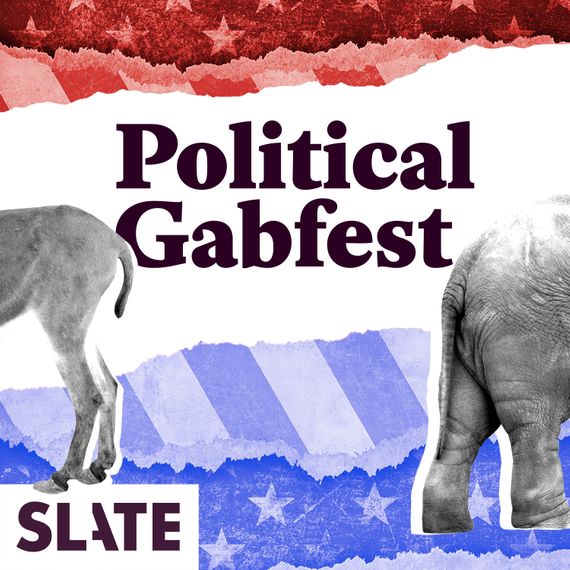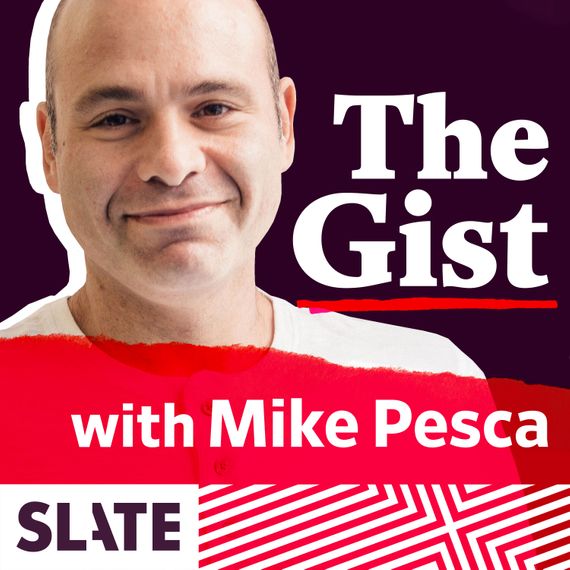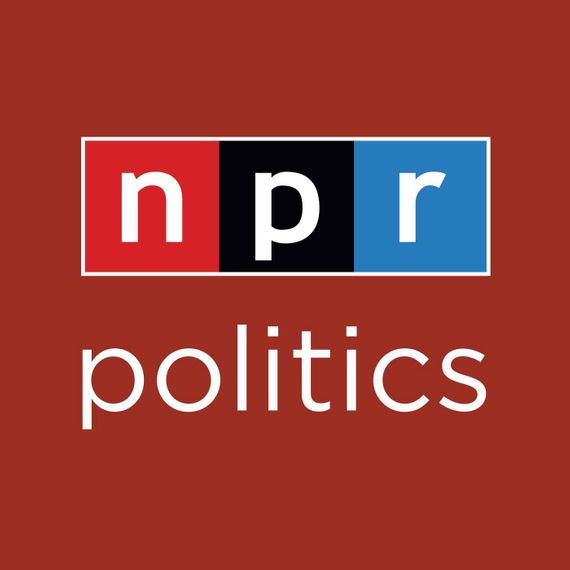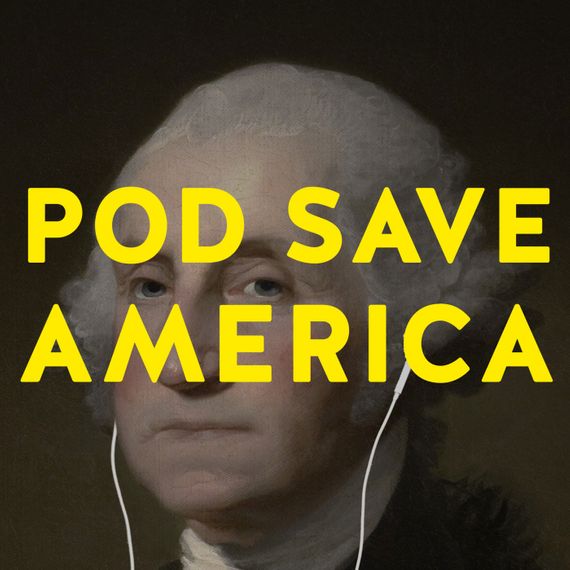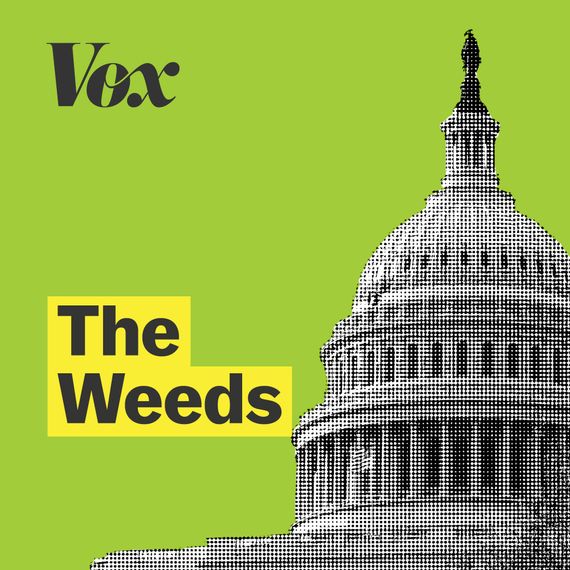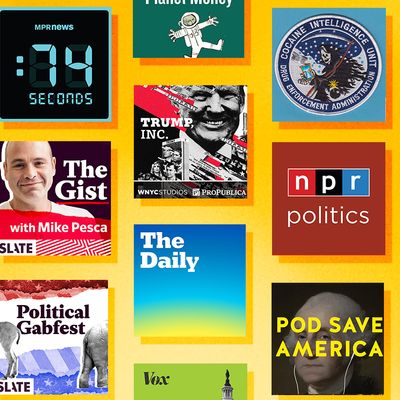
Talking about the news with your friends in 2019 can be embarrassing, tedious, and alienating. Discussing political news in particular — whether we’re “weighing in” on the latest Trump scandal or offering some warmed-over, vague analysis of the Democratic race — makes most of us sound like basic jerks, playing at pundits because we want to feel less passive in the face of chaos. This is one reason why news and politics podcasts have grown so popular since Trump took over: Not only does listening to them give us ideas for cool stuff to say later, it also soaks up some of the social energy we feel compelled to devote to processing this relentlessly historic era.
Of course, news and politics have been providing the raw materials for podcasts since long before Trump. And in many ways, the formal evolution of podcasting as a whole has been pushed forward by producers and hosts trying to come up with new ways of talking about the news. Insofar as most podcasts are fundamentally journalistic undertakings, it’s because they provide a unique — and uniquely pliable — vessel for news coverage.
As reflected on this list, a news podcast can do its thing in a variety of idioms. It can take the form of an ensemble-led talk show, a story, a magazine, or — more simply — a conversation between two people. Yet what they all arguably have in common is the expectation that they will be consumed by people who are focused, motivated to understand events they can’t control, and — this sounds darker than I mean it to — moving through the world alone. That’s the cliché podcasters like moi are constantly throwing around to justify our existence: that podcasting is a distinctly intimate medium, that people form a special connection to podcast hosts because they have us in their ears while they’re walking around and living their lives.
It’s a good, accurate cliché! But then again, the news isn’t supposed to be personal, is it? In some ways it’s supposed to be the opposite — a reminder to suppress one’s solipsism and myopia, as well as an invitation to care about what’s happening to people we don’t know. Maybe that’s why the news and politics podcasts I’ve singled out here all work so well: Each one meets us where we live (inside our own heads), while making it slightly easier to look up at our surroundings.
Slate Political Gabfest
The oldest podcast on this list, Slate’s Political Gabfest launched in 2005 and has maintained the same three hosts and same three-topic structure ever since. David Plotz, John Dickerson, and Emily Bazelon— all of whom worked at Slate when the show started but no longer do— have a sibling-like rapport: interrupting, laughing, and teasing (sometimes quite brutally). They are experts, but ones whose intimacy and affection for one another permits a kind of genuine intellectual candor. They are funny, informed, and sometimes thrillingly mean. Their thinking is collaborative; they change each other’s minds. Listening to them is like witnessing an essay being written in real time by a writer trying to untangle an idea with their smartest friends. Fans who remember the days of iPods and frantic “syncing” feel like they know the hosts as well as the hosts know each other, a then novel sensation that’s now familiar to many podcast listeners. And because they make it look (sound) so easy, they’ve inspired countless other political junkies to build their own roundtables and try to capture Gabfest’s timeless magic.
Planet Money
The creators of Planet Money, Alex Blumberg and Adam Davidson, famously had to fight like hell with their bosses at NPR to get the show launched during the financial crisis of 2008. In the end, both Blumberg and Davidson left public radio to create podcasting empires of their own – Blumberg is the founder of Gimlet; Davidson recently started a podcast company with backing from Sony — but not before creating a blueprint for what a news podcast could sound like and what holes it could fill in a listener’s understanding of the world. By combining intimacy with expertise, and putting out episodes that ranged from a few minutes to an hour, Blumberg and Davidson proved that podcasters could be themselves while experimenting with form and setting hugely ambitious journalistic goals — as long as they never failed to be entertaining.
The Gist
Mike Pesca, host of The Gist since 2014, invented the daily news podcast. But if you’ve heard Pesca’s jagged yet breezy virtuosity on the mic, you know it’s hard to give him credit for influence for the simple reason that no one sounds like him and no other podcast moves like his. The Gist follows a consistent formula: funny intro from Mike, followed by a zippy interview with a guest, and a searching, intellectually transparent monologue known as the daily “spiel.” On its best days, The Gist feels like an early aughts blog, hosted by a guy who reads more widely than anyone you’ve ever met and takes pride in constantly making jokes, even when he’s trying to explain why something drives him nuts.
NPR Politics Podcast
There’s an inevitable tension between NPR’s impeccably poised and aggressively neutral house style and what’s supposed to be the personality-driven, opinionated palette of podcasting. But on the NPR Politics Podcast, public radio’s finest manage to elbow their way out of the box, delivering their analysis with verve and rolled-up sleeves. In doing so, they allow their personalities to emerge in 3-D, giving reporters like Sam Sanders (now the host of his own podcast, It’s Been a Minute) a chance to become stars. NPR continues to adapt to the moment — they just announced that Politics Podcast will go daily in an effort to keep up with the pace of breaking news. It’s only a matter of time until audiences demand that they produce new episodes every 30 minutes.
The Daily
Within months of its 2017 launch, the New York Times’ now-flagship podcast had over 100 million downloads. From the beginning, its existence felt urgent. Whether grilling Maggie Haberman and Michael Schmidt about the latest presidential catastrophe or talking to a grieving New York City taxi driver, host Michael Barbaro delivers his lines with a practiced, soothing tenderness that never betrays alarm but always connotes curiosity. In speaking to his colleagues from the paper, Barbaro takes listeners inside the Times newsroom, offering glimpses into the reporting process and driving home the reality that, behind each byline, lives a human being who is sometimes stressed out, sometimes perplexed, and pretty much always working. For fans of The Daily — people who, despite all efforts to the contrary, now spend their lives absorbing bad news — the podcast has become a beloved habit clung to in difficult circumstances. For the Times, it has become a way of embracing the internet-born trend toward personality-driven news coverage, and a megaphone for reporting and analysis that might otherwise reach far fewer people.
Pod Save America
Pod Save America has the kind of fanbase you might expect of a K-pop group or an actual presidential candidate. Launched as the spiritual successor to Keepin’ It 1600 by a group of young Obama alums, Pod Save America found a huge audience of revved-up liberals in the wake of Trump’s election and broke through to the mainstream in a way that no other podcast talk show has ever done. Since then, it’s become an all-but-mandatory stop for Democratic figures looking to raise their profile — especially if they want to occupy the White House. But its guests, as impressive as they are, are almost beside the point. “Pod Save,” as it’s affectionately known, has made legitimate, Radio City Music Hall–level stars of hosts Jon Favreau, Jon Lovett, Tommy Vietor, and Dan Pfeiffer. They’ve been able to parlay the show’s success into a larger Crooked Media empire, which includes multiple spinoff pods, an HBO show, and a line of “Friend of the Pod” T-shirts that tells the world, “I care about politics so much I listen to podcasts about it.”
Chapo Trap House
You know the guy at your office who thinks he and his friends should start a podcast where it’s just them, like, riffing? Blame it on Chapo Trap House, the shaggy crew of socialist comics who have inspired a million amateur podcasts that never made it past episode two. Ironically, these anti-capitalists have distinguished themselves in the podcast space by printing money on Patreon. And while Will Menaker, Matt Christman, and Felix Biederman weren’t professional pundits or journalists when they decided to start their show in the midst of the 2016 campaign, they’re now the poster boys of podcasting’s thriving comedy-adjacent (and, sometimes, politics-adjacent) leftist wing (see: Cum Town, Red Scare). Ever since, they’ve set up permanent residence on the slippery slope, blurting out jokes that make some people hate them while building a loyal audience made up of the so-called Dirtbag Left, a.k.a. irreverent liberals who think the Pod Save America guys are a bunch of sellouts.
74 Seconds
This podcast from Minnesota Public Radio is about the death of Philando Castile at the hands of a police officer who shot him during a traffic stop. The 22 episodes that comprise the show start with a zoomed-in look back at the incident, captured from multiple revelatory angles, before pivoting to real-time coverage of the trial in which the officer, Jeronimo Yanez, was ultimately acquitted. 74 Seconds, which won the Peabody Award, is a demonstration of how podcasts create space to slow down the news and examine its texture, without sacrificing relevance or urgency.
Trump Inc.
President Trump likes to brag about the number of jobs he has created, but what he never mentions is that most of them are in podcasting. Of all the Trumpcentric podcasts out there, Trump, Inc. from WNYC and ProPublica stands out for its depth and shape. Every episode places some aspect of the Trump family business under scrutiny — one week it’s the inaugural fund, another week it’s Trump Tower Moscow, and so on. In the tradition of old-school beat reporting, it’s like they’re pointing a spotlight at a big but finite canvas and moving it around until they find something amazing and newsworthy. Sound-rich but light on its feet, this podcast is a middle ground between the fussy prestige fare that podcast listeners love and the kind of elegant, unadorned reporting that usually gets published on newsprint.
The Weeds
Vox* is known for its “explainers,” which can now be consumed in the form of articles, online video, and television. In some ways, The Weeds is just the podcast version of that same sensibility: a twice-weekly roundtable featuring some combination of Matthew Yglesias, Ezra Klein, Sarah Kliff, Jane Coaston, Dara Lind, and occasional guests going in-depth on complicated political topics. Crucially, though, the Weeds team generally declines to provide the kind of explainer that distills a complex issue into its simplest, most easily digested form. Instead, the hosts luxuriate in the sometimes quite obscure intricacies of policy proposals and academic papers. In doing so, The Weeds takes full advantage of its listeners’ willingness to pay sustained attention to a detailed, defiantly dense discussion. It’s a level of patience and immersion that journalists seldom get to achieve in any other form.
*You should know: Vox Media and New York Media, the parent company of New York Magazine and Vulture, recently announced plans to merge.


